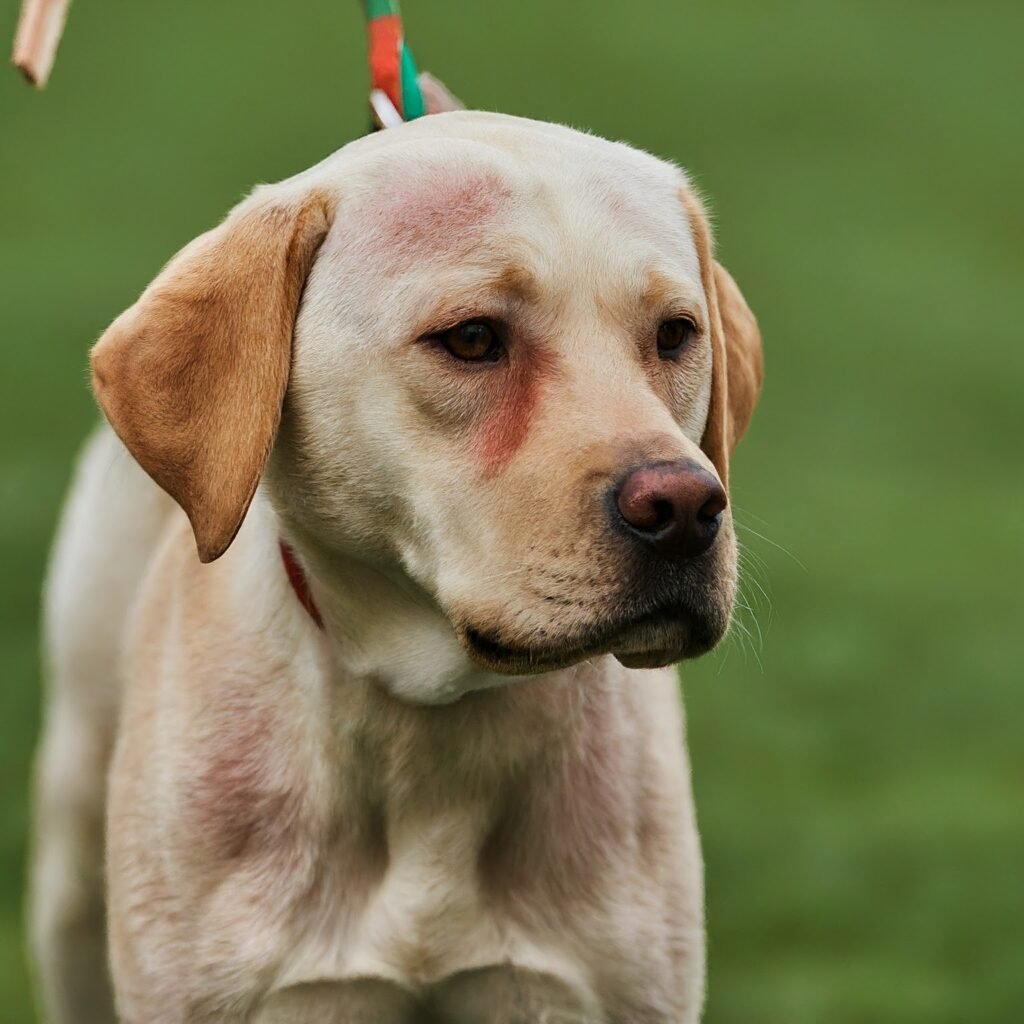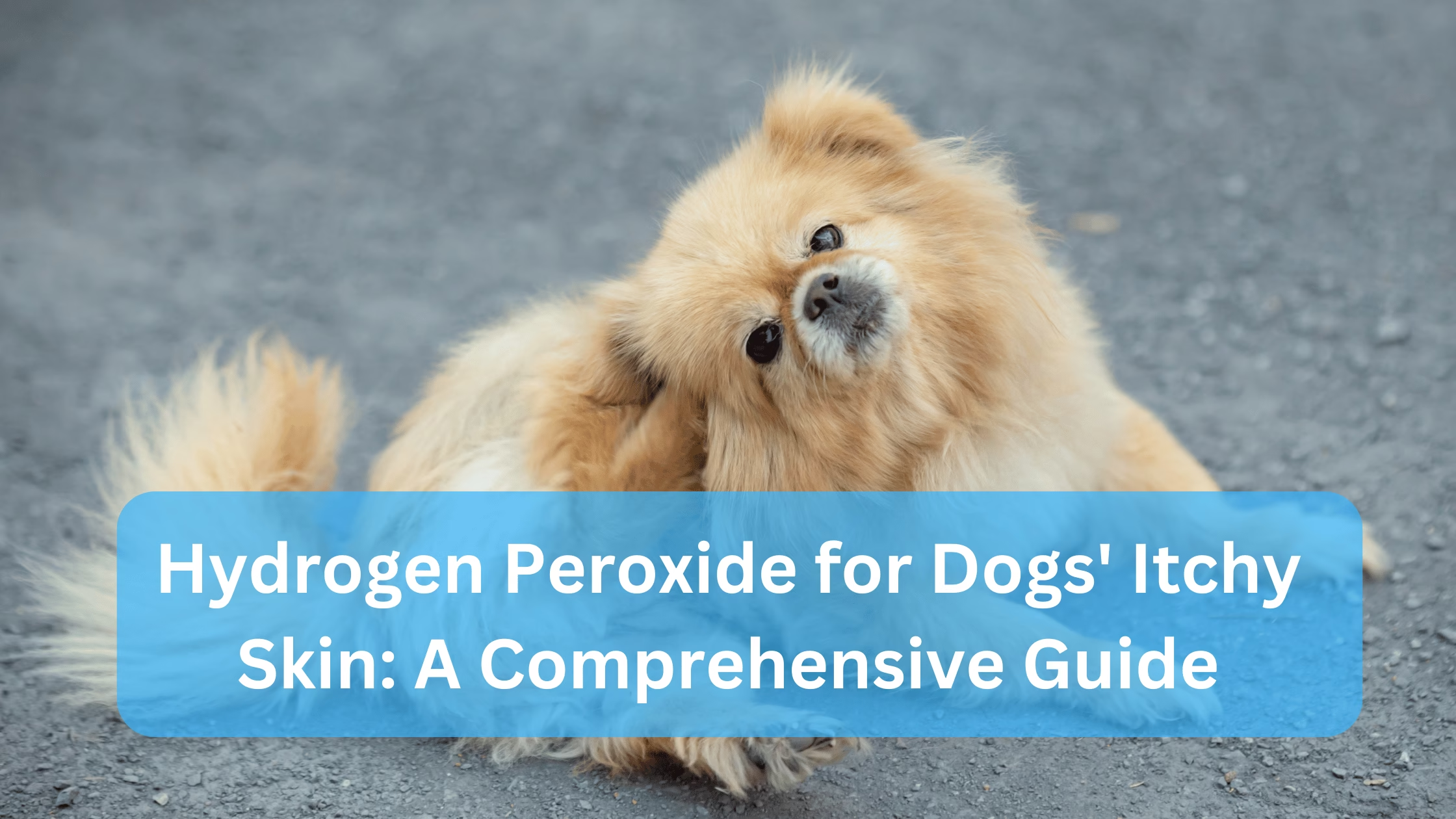Hydrogen Peroxide for Dogs’ Itchy Skin: Hydrogen peroxide is a common household item with many uses, ranging from cleaning wounds to disinfecting surfaces. Recently, pet owners have been exploring its benefits for treating various conditions in dogs, including itchy skin. This article delves into how hydrogen peroxide can be used for dogs’ itchy skin, its benefits, potential risks, and best practices for safe application.
What is Hydrogen Peroxide?
Hydrogen peroxide (H₂O₂) is a chemical compound made up of two hydrogen atoms and two oxygen atoms.
It appears as a clear, colorless liquid and is commonly available in a 3% concentration solution for household use.
Hydrogen peroxide is known for its antiseptic properties, making it useful for cleaning wounds and preventing infection.
Common Causes of Itchy Skin in Dogs

Before exploring how hydrogen peroxide can help, it’s essential to understand the common causes of itchy skin in dogs:
- Allergies: Dogs can suffer from various allergies, including food, environmental (pollen, dust mites), and contact allergies (shampoos, fabrics).
- Parasites: Fleas, ticks, and mites can cause intense itching and discomfort.
- Infections: Bacterial and fungal infections can lead to itchy, inflamed skin.
- Dry Skin: Low humidity levels or underlying health conditions can result in dry, flaky skin.
- Hot Spots: Localized areas of inflamed and infected skin caused by scratching, licking, or biting.
Benefits of Hydrogen Peroxide for Dogs’ Itchy Skin
Hydrogen peroxide offers several benefits when it comes to treating dogs’ itchy skin:
- Antiseptic Properties: Hydrogen peroxide helps clean wounds and reduce the risk of infection by killing bacteria and fungi.
- Oxidizing Agent: It helps remove dead skin cells and debris, promoting healthier skin.
- Mild Astringent: It can help dry out moist, infected areas, reducing irritation and promoting healing.
- Cost-Effective: Hydrogen peroxide is an affordable and readily available solution for many pet owners.
How to Use Hydrogen Peroxide for Dogs’ Itchy Skin
While hydrogen peroxide can be beneficial, it’s crucial to use it correctly to avoid potential risks:
- Dilution: Using hydrogen peroxide directly on your dog’s skin can be harmful. Always dilute it with water. A common dilution ratio is one part hydrogen peroxide to three parts water.
- Spot Testing: Perform a patch test on a small area of your dog’s skin to ensure they don’t have an adverse reaction.
- Cleaning: Use hydrogen peroxide to clean minor wounds or hot spots by gently dabbing the affected area with a cotton ball soaked in the solution.
- Rinsing: After applying hydrogen peroxide, rinse the area thoroughly with clean water to remove any residue and prevent further irritation.
- Avoid Sensitive Areas: Do not apply hydrogen peroxide near your dog’s eyes, nose, mouth, or genitals.
Is hydrogen peroxide safe for dogs with itchy skin?
While hydrogen peroxide can be effective, there are potential risks and precautions to consider:
- Skin Irritation: Overuse or improper dilution can cause skin irritation or burns.
- Tissue Damage: Hydrogen peroxide can damage healthy tissue if used excessively or on large wounds.
- Ingestion Risks: Ingesting hydrogen peroxide can be harmful to dogs, causing vomiting or gastrointestinal issues. Ensure your dog doesn’t lick treated areas.
- Avoid Open Wounds: Do not apply hydrogen peroxide to open wounds as it can damage the tissue and delay healing.
- Veterinary Consultation: Always consult with a veterinarian before using hydrogen peroxide, especially for severe or persistent skin issues.
Alternative Home Remedies for Itchy Skin
Apart from hydrogen peroxide, several home remedies can help alleviate your dog’s itchy skin:
1. Oatmeal Baths
Oatmeal is renowned for its soothing properties. An oatmeal bath can help reduce itching and inflammation. Simply grind plain oatmeal into a fine powder and mix it with warm water to create a soothing bath for your dog.
2. Coconut Oil
Coconut oil can be applied directly to the skin to moisturize and provide relief from itching. It has antibacterial and antifungal properties, making it an excellent choice for treating skin irritations.
3. Apple Cider Vinegar
Apple cider vinegar, when diluted with water, can be used as a spray or a rinse to combat bacteria and fungi on your dog’s skin. The typical ratio is one part apple cider vinegar to two parts water.
4. Aloe Vera
Aloe vera is known for its healing properties. It can be applied directly to the skin to reduce redness and irritation. Ensure that you use pure aloe vera gel without any additives.
Dietary Considerations
Diet plays a crucial role in your dog’s skin health. Consider the following dietary adjustments:
- Omega-3 Fatty Acids: Found in fish oil, these can help reduce inflammation and promote healthy skin.
- Balanced Diet: Ensure your dog is getting a balanced diet with all essential nutrients.
- Hypoallergenic Foods: If allergies are suspected, switch to hypoallergenic dog food to identify potential allergens.
When to Seek Professional Help
While home remedies and over-the-counter treatments can be effective, there are times when professional help is necessary:
- Persistent Itching: If the itching does not subside or worsens.
- Open Sores or Wounds: Presence of open sores, wounds, or bleeding.
- Behavioral Changes: If your dog shows signs of distress or behavioral changes due to itching.
- Secondary Infections: If you notice signs of secondary infections like pus, foul odor, or excessive redness.
Preventative Measures
Preventing itchy skin in dogs is better than treating it. Here are some preventative measures to consider:
- Regular Grooming: Keep your dog clean and groomed to prevent parasites and skin issues.
- Flea and Tick Control: Use appropriate flea and tick control measures.
- Healthy Diet: Provide a balanced diet rich in essential nutrients.
- Regular Vet Check-ups: Regular visits to the vet to catch any potential issues early.
Also Read: Anise for Dogs (Dognip): A Comprehensive Guide
Also Read: Spayed Female Dog Itchy Nipples: A Comprehensive Guide.
Conclusion
Hydrogen peroxide can be a useful tool in managing your dog’s itchy skin when used correctly.
However, it is essential to identify the underlying cause of the itching and consult with a veterinarian before starting any treatment.
Combining home remedies, dietary adjustments, and preventative measures can help keep your dog’s skin healthy and itch-free.
Remember, your dog’s comfort and well-being are paramount, and with the right approach, you can ensure they live a happy, itch-free life.







